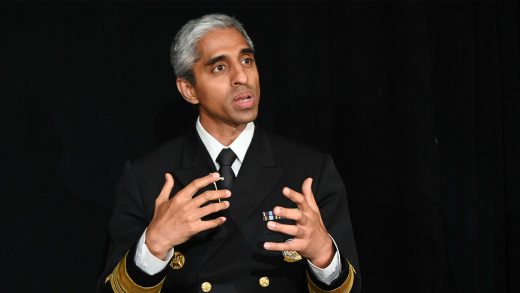Social media needs cigarette-style warning labels in mental health ’emergency’: surgeon general
Social media needs cigarette-style warning labels in mental health ’emergency’: surgeon general
Vivek Murthy argues that warning labels, which have been effective in reducing smoking, would remind parents that “social media has not been proved safe.”
BY Sarah Bregel
The U.S. surgeon general wants social media platforms to come with warning labels.
In an op-ed for the New York Times on Monday, Dr. Vivek Murthy demanded that Congress require social media companies to put a label on their apps, mirroring the warnings required on cigarettes and other products containing tobacco, as well as those containing alcohol.
“The mental health crisis among young people is an emergency—and social media has emerged as an important contributor,” Murthy wrote.
This is not the first warning that Murthy has given the public about the impact of social media on young people. Last year, he issued a report on the subject, and asked social media companies to do more to investigate the link between social media use and mental health.
“To date, the burden of protecting youth has fallen predominantly on children, adolescents, and their families,” Murthy wrote at the time. “The entire burden of mitigating the risk of harm of social media cannot be placed on the shoulders of children and parents.”
Is social media an ‘addiction’?
Ninety-five percent of teens have some form of social media, and they spend close to four hours a day using it, according to a 2023 Gallup Poll. There has been some research to support the view that depression rates rise with greater social media use in teens. What isn’t clear is that social media meets the criteria for being “addictive.”
Scientists remain torn on that question.
Niklas Ihssen, an associate psychology professor at Durham University in the U.K., has suggested that we shouldn’t rush to assert such claims.
Ihssen and one of his postgraduate students, Michael Wadsley, recently published research in the journal PLOS ONE, in which 51 students avoided social media for 15 days. While one-third of the participants had social media habits that were deemed problematic, the students did not experience withdrawal symptoms that are consistent with addictive substances or activities.
Still, many other scientists urge caution around social media. There’s no shortage of reasons not to. From higher rates of depression being reported, to lower rates of life satisfaction, and repercussions we likely aren’t even aware of yet, social media has some clear negative impacts.
Some states are taking action against the algorithmic methods that social media companies use to pinpoint our interests and funnel them all directly into our feeds with the goal of keeping us on social media longer.
Murthy remains steadfast in his view that there is great harm being done by all of it.
“It is time to require a surgeon general’s warning label on social media platforms, stating that social media is associated with significant mental health harms for adolescents,” Murthy wrote. “A surgeon general’s warning label, which requires congressional action, would regularly remind parents and adolescents that social media has not been proved safe.”
Are warning labels even effective?
In 1965, when warning labels were placed on cigarettes, smoking rates steadily went down. It was a wake-up call to the public, which largely was not aware of just how deadly smoking could be.
However, most social media users are likely to have already heard plenty of critiques aimed at platforms like Facebook, Instagram, and TikTok. In many cases, they continue to use them in spite of those fairly rampant conversations. It’s unclear if kids, of all people, would worry a terrible amount about warning labels—at least, enough that it would impact their habits.
If Congress does decide to heed Murthy’s warning, and require websites and apps to come with worry-inducing warnings, it will be interesting to see who pays attention.
ABOUT THE AUTHOR
(3)



